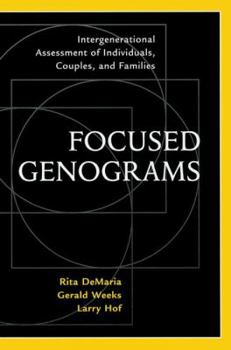Focused Genograms: Intergenerational Assessment of Individuals, Couples, and Families
Select Format
Select Condition 
Book Overview
Focused Genograms provides a cutting-edge guide to utilizing the Intersystem Approach meta-framework and attachment theory to construct focused genograms. Focused genograms are graphic representations... This description may be from another edition of this product.
Format:Paperback
Language:English
ISBN:0876308817
ISBN13:9780876308813
Release Date:March 1999
Publisher:Routledge
Length:240 Pages
Weight:0.76 lbs.
Dimensions:0.5" x 6.0" x 9.0"
Customer Reviews
1 rating
A multigenerational, intrapersonal practical counseling tool
Published by Thriftbooks.com User , 24 years ago
Family systems are facinating, dynamic, and multidimensional. Psycologists and counselors have developed systems for studying them. M. Bowen and Systems Theory are well linked to the development and use of genograms in family and individual therapy, for instance. Genogram are used in American Association of Marriage and Family Thereapists clinical training and supervision programs, and are an important tool in the clinical process. Medical schools and practices, genetic counselors, and even business and organizational settings find them useful. Genograms, though, have their limitations which the authors summarize well, proceeding to make a clear case for what they have developed: the Multilayered Focused Genogram (MFG). They make a graphic comparison of current genograms as normal X-ray exam, to MFG system which for them is like the hospital MRI exam, providing much more in-depth information. Actually, the MFG is a combination of the Basic Genogram, Family Map and Time Line, amplified with one or more Focused Genograms. It is an inclusive system of assessing issues in all aspects of a client's personal and multi-generational history as well as present day circumstances. I appreciate the format of the book for its clarity. In the first third, the authors address succinctly each of the three main components of MFGs using vignettes and rationals for collecting and organizing so much data about the client and his or her family system. They provide practical applications and diagrams for the clinician's immediate use. The last two thirds of the book address Focused Genograms, outlining a surprising fifty plus possible topics of focus, and concentrate a chapter on the major ones: attachments, emotions, anger (as an important, specifically independent focus), gender, sexuality, romantic love and culture. The first part of each of these last chapters is a guide to the construction and uniqueness of each, while the last half gives the basic theoretical concepts and research that supports the inclusion of the particular topics for each Focused Genogram. Though the book does not pretend to be a critical review of the literature, the text is peppered with references, each chapter offers suggested reading, and includes a good bibliography of over 225 books as well as comments on two computerized genogram programs. Neither is the book a complete exploration of the topical areas but rather an strong overview, and therefore, would be useful to graduate students (in counseling, psychology, genetics, medicine, or business) or anyone who wanted to upgrade their current use of genograms to incorporate this meaningful and extensive MFG tool into their counseling practice. Focused Genograms kept my interest throughout, and it was well worth my time. I will make good use of the practical list of suggested question it contains in every chapter with my clients starting right away.






